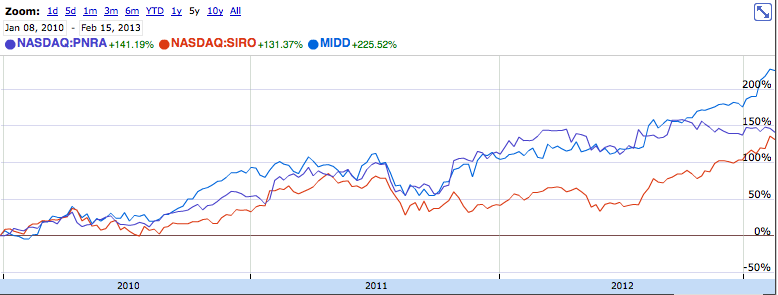Circuit City was the best performing stock of the 80s. It is bankrupt today. Best Buy drank their milkshake in the 1990s. Amazon killed them in the 2000s.
$DELL won the 90s. It is likely going private at 75% below its highest point.
Green Mountain Coffee ($GMCR) and Monster Beverage ($MNST) – formerly Hansen Natural, were the best performers of the 2000s. The former is trading 60% below its all-time high, the latter is about 40% below all-time high.
And yet, some of the best performers of the 2000s, have done incredibly well since 2010.
In the first decade of the new century, Panera Bread ($PNRA) gained 1600%, Middleby Corp. ($MIDD) gained 1700%, Sirona Dental Systems ($SIRO) gained 2600%. They haven’t done too poorly since 2010:
Sooner or later, all trends end – some more abruptly than others. This is not to say that momentum does not work as an equity selection system. It just does not work all the time. The rule of thumb is that the best performers of the past 6 months to 3 years, tend to outperform in the next 6 months to 3 years. Anything beyond that, usually leads to mean reversion.
Why some stocks experience much deeper mean-reversion and others consolidate mostly through time?
The stock market is a forward-looking mechanism that discounts pro-actively, often 6 to 18 months into the future. Price momentum usually leads earnings and sales growth in the first phase of any long-term stock market trend. Then, if fundamentals don’t catch up, there’s a mean-reversion.
The market is not stupid. It makes an assumption, sometimes based only on a good story, other times based on real fundamentals; it discounts that assumption pro-actively, but in the same time it is expecting positive feedback in terms of actual earnings and sales growth. If the latter don’t come, a correction follows. If earnings and sales growth numbers confirm and exceed market expectations, the trend continues.
Most stocks don’t manage to live up to market expectations about them. This is why market history is full of thousand of examples of stocks that made 200-300% return in a year or two that then gave back most of it. There are very few stocks that manage to keep up with market expectations in the long run.

6 thoughts on “The Best Performers Of the Past Decade Are Never the Best Performers Of the Next Decade”
Comments are closed.